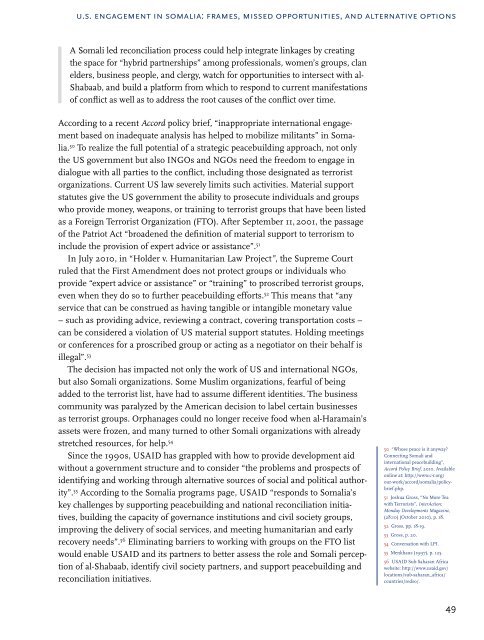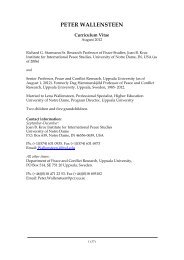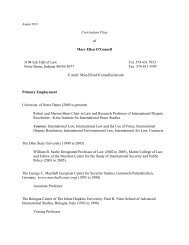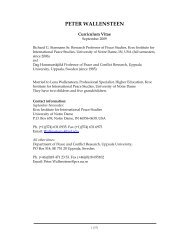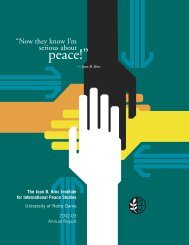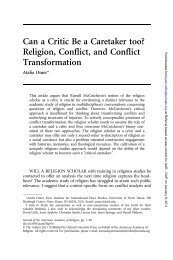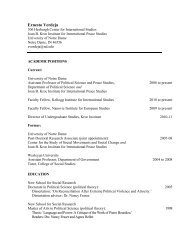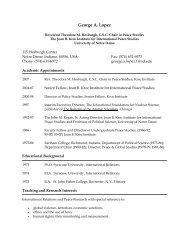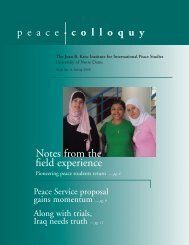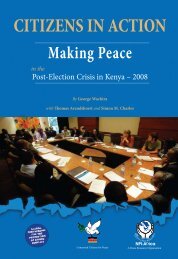Somalia: Creating Space for Fresh Approaches to Peacebuilding
Somalia: Creating Space for Fresh Approaches to Peacebuilding
Somalia: Creating Space for Fresh Approaches to Peacebuilding
Create successful ePaper yourself
Turn your PDF publications into a flip-book with our unique Google optimized e-Paper software.
u.s. engagement in somalia: frames, missed opportunities, and alternative options<br />
A Somali led reconciliation process could help integrate linkages by creating<br />
the space <strong>for</strong> “hybrid partnerships” among professionals, women’s groups, clan<br />
elders, business people, and clergy, watch <strong>for</strong> opportunities <strong>to</strong> intersect with al-<br />
Shabaab, and build a plat<strong>for</strong>m from which <strong>to</strong> respond <strong>to</strong> current manifestations<br />
of conflict as well as <strong>to</strong> address the root causes of the conflict over time.<br />
According <strong>to</strong> a recent Accord policy brief, “inappropriate international engagement<br />
based on inadequate analysis has helped <strong>to</strong> mobilize militants” in <strong>Somalia</strong>.<br />
50 To realize the full potential of a strategic peacebuilding approach, not only<br />
the US government but also INGOs and NGOs need the freedom <strong>to</strong> engage in<br />
dialogue with all parties <strong>to</strong> the conflict, including those designated as terrorist<br />
organizations. Current US law severely limits such activities. Material support<br />
statutes give the US government the ability <strong>to</strong> prosecute individuals and groups<br />
who provide money, weapons, or training <strong>to</strong> terrorist groups that have been listed<br />
as a Foreign Terrorist Organization (FTO). After September 11, 2001, the passage<br />
of the Patriot Act “broadened the definition of material support <strong>to</strong> terrorism <strong>to</strong><br />
include the provision of expert advice or assistance”. 51<br />
In July 2010, in “Holder v. Humanitarian Law Project”, the Supreme Court<br />
ruled that the First Amendment does not protect groups or individuals who<br />
provide “expert advice or assistance” or “training” <strong>to</strong> proscribed terrorist groups,<br />
even when they do so <strong>to</strong> further peacebuilding ef<strong>for</strong>ts. 52 This means that “any<br />
service that can be construed as having tangible or intangible monetary value<br />
– such as providing advice, reviewing a contract, covering transportation costs –<br />
can be considered a violation of US material support statutes. Holding meetings<br />
or conferences <strong>for</strong> a proscribed group or acting as a negotia<strong>to</strong>r on their behalf is<br />
illegal”. 53<br />
The decision has impacted not only the work of US and international NGOs,<br />
but also Somali organizations. Some Muslim organizations, fearful of being<br />
added <strong>to</strong> the terrorist list, have had <strong>to</strong> assume different identities. The business<br />
community was paralyzed by the American decision <strong>to</strong> label certain businesses<br />
as terrorist groups. Orphanages could no longer receive food when al-Haramain’s<br />
assets were frozen, and many turned <strong>to</strong> other Somali organizations with already<br />
stretched resources, <strong>for</strong> help. 54<br />
Since the 1990s, USAID has grappled with how <strong>to</strong> provide development aid<br />
without a government structure and <strong>to</strong> consider “the problems and prospects of<br />
identifying and working through alternative sources of social and political authority”.<br />
55 According <strong>to</strong> the <strong>Somalia</strong> programs page, USAID “responds <strong>to</strong> <strong>Somalia</strong>’s<br />
key challenges by supporting peacebuilding and national reconciliation initiatives,<br />
building the capacity of governance institutions and civil society groups,<br />
improving the delivery of social services, and meeting humanitarian and early<br />
recovery needs”. 56 Eliminating barriers <strong>to</strong> working with groups on the FTO list<br />
would enable USAID and its partners <strong>to</strong> better assess the role and Somali perception<br />
of al-Shabaab, identify civil society partners, and support peacebuilding and<br />
reconciliation initiatives.<br />
50 “Whose peace is it anyway?<br />
Connecting Somali and<br />
international peacebuilding”,<br />
Accord Policy Brief, 2010. Available<br />
online at: http://www.c-r.org/<br />
our-work/accord/somalia/policybrief.php.<br />
51 Joshua Gross, “No More Tea<br />
with Terrorists”, InterAction:<br />
Monday Developments Magazine,<br />
(28:10) (Oc<strong>to</strong>ber 2010), p. 18.<br />
52 Gross, pp. 18-19.<br />
53 Gross, p. 20.<br />
54 Conversation with LPI.<br />
55 Menkhaus (1997), p. 125.<br />
56 USAID Sub-Saharan Africa<br />
website: http://www.usaid.gov/<br />
locations/sub-saharan_africa/<br />
countries/redso/.<br />
49


